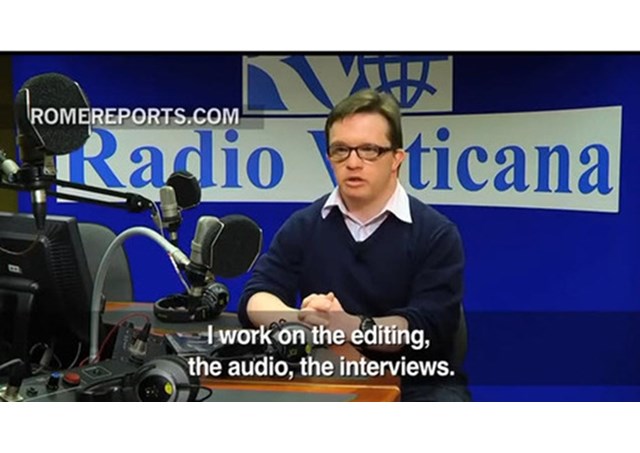
World Down Syndrome Day: 'Anything is possible!'

(Vatican Radio) March 21 marks the 10th anniversary of World Down Syndrome Day.
It’s a day established to help raise awareness of what Down syndrome is, what it means to have Down syndrome, and how people with Down syndrome play a vital role in our lives and communities.
Events are organized in many countries aiming to create a single global voice for advocating for the rights, inclusion and well-being of people with Down syndrome.
To mark the occasion here at Vatican Radio, Linda Bordoni spoke to May Gannon, dramatherapist, counsellor and member of staff at Down Syndrome Ireland. May is also the mother of media student Michael Gannon who did an internship at VR’s English Section in January 2014 before going on to obtain a degree in communications.
May begins by talking about the meaning of a Day such as this.
Listen to the interview:
“For me it is a celebration of life for people with Down syndrome, because for many years they were excluded from society, and now – certainly in Ireland – we see people with Down syndrome much more in our society, in shops, on buses, on trains… and sometimes in the workplace although that is one area that we still need to work on with regards of getting meaningful employment for people with Down syndrome” she says.
May says that for the families of children born with Down syndrome the first difficulty is represented by the fear many parents face regarding whether or not they can do a good job of bringing up a child with Down syndrome.
In order to that – she says – they need resources: “if you have lots of money then it’s not as big an issue for you as someone who is surviving on an ordinary salary”.
She explains that if your child needs speech and language therapy, and physiotherapy, or if he needs a heart operation you are depending on the State to supply those resources to you.
And while State support has improved, May says “there is still a lot of work to be done to help parents to cope in those first years”.
She says that people continue to say there are many things that can be done these days, and while that is true, “very often the responsibility for providing the resources and the therapy falls on the mom and dad, and probably today still, more on the mom than on the dad”.
May says that in today’s society people with Down syndrome can hope to live a very fulfilled life; she highlights the fact that they can do more today than anybody expected from them.
“My son is 35. When he was born I was told he would never read or write and there was no point in teaching him” she says.
But today May says, that would never be said to a parent. In fact we know that reading helps to develop language and so children are given education at a very early stage. In many countries they are included in mainstream education, and through being with typically developing students, they also understand the normal path of life and its various stages.
“People with Down syndrome nowadays understand what it is to be part of society because they are included from the very beginning” she says.
May points out that while parents get concerned and stressed about resources and the lack of them, she says that the resources you have at a particular time are the ones you have to work with because “there is never going to come a day when everything they need is in place at a particular time”.
Speaking of her son Michael, May says he is extremely positive about himself and about interacting with others.
“His mantra is: see the person and not their Down syndrome” she says.
And his new philosophy is: “Anything is possible!”
She speaks of the positive effect the Vatican Radio internship - and especially the meeting with Pope Francis - has had on Michael: “because he does now believe that anything is possible”.
May invites all to highlight the positive value of people with Down syndrome in our society, to include them in every level of society, to include them in Church ceremonies. Not in a ‘tokenistic’ way, but in a real way.
She warns against possible patronizing attitudes of well-thinkers because, May says, people with Down syndrome “have a strong sense of themselves and an innate sense of justice”, and if poorly treated it is easy to make them feel ‘put down’.
May concludes with a word for employers inviting them to always look to see if they can have a person with Down syndrome in the workplace: “they make very good employees, they will be there on time every day, they will do the work assigned to them in a very focused way, and the effect they have on other members of the workforce has always been positive – that’s the research that has been done on employing people with Down syndrome”.
Certainly, the experience of having had Michael Gannon work with us at Vatican Radio, confirms that that is the case!
| All the contents on this site are copyrighted ©. |


